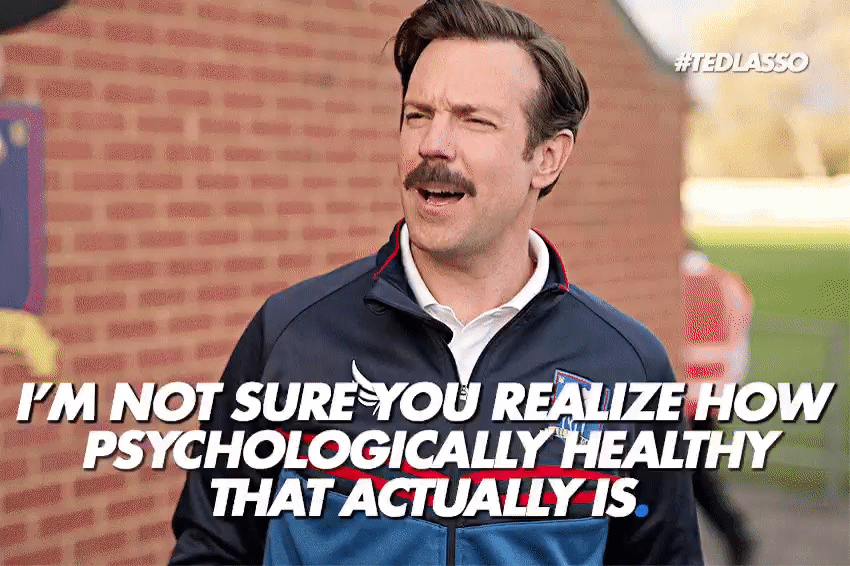Ted Lasso believes in believe. After finishing the first season of the hit sitcom on Apple TV in a week, this much is abundantly clear. Without spoiling the plot (*this is a lie, I do spoil the plot), Ted arrives in Richmond, a town in South-west London, England from Kansas to coach AFC Richmond, a premier league football team, despite only having ever coached American college football. He is entirely undeterred by his inexperience, casually asking the referee what an ‘offside’ call is halfway through the season. When the entire stadium chants ‘wanker’ upon his presence to communicate their displeasure in his employment, he is pleasantly amused, and instead befriends anyone who will make eye contact with him. Through textbook idioms, a steady hopeful spirit and southern sincerity he sets off to reconstruct a broken team, into a connected, and therefore more effective one.
The main stage of the show is the AFC Richmond locker room, where all the tropes of a testosterone-driven team are present: there is the young superstar who is obsessed with himself and treats everyone as his subordinate; the older superstar and team captain who detests the younger one while grappling with an aging body; the locker room attendant who is invisibilized in his working. class, left to clean up towels and sweaty uniforms, and take the odd slap around; and the international athletes who are visibly homesick in the wash of English culture, but maintain a silent gratefulness for the opportunity.
To deconstruct some of these dynamics, Ted leans on establishing a sense of team spirit - walking right off the plane and into the locker room to hang up a poster that reads ‘Believe.’ But his real strategy is to play with the existing power dynamics in healthier ways. Investing into building trust with the team captain, and giving power to the lowest-ranked member of the team, becomes the way to model a new kind of leadership and camaraderie that appears to have somewhat of a trickle up and down effect. He demonstrates an acute ability in deciphering who to nudge and when and where to intervene in team dynamics, so that the dominos ultimately fall in his favour on the pitch.
In the background of all his ‘direct strategies,’ there is a process of humanizing each of the main characters, revealing clues of their lived experiences that bring them to this moment where their operating models of self-protection keep them from seeing themselves and each other. How many of them behave in the locker room and on the pitch is not arbitrary. Between having parents with impossibly high expectations, constructing identities around being the best to avoid dissolving into oblivion, and adopting the framework of sports masculinity, we see the athlete ego as one that was initially constructed to survive, but became useful to thrive in a microcosm built on competitive binaries and scarcity.
Aside from Nathan, the locker room attendant, who is so moved that Ted asks what his name is, remembers what his name is, and is interested in his opinion, the rest of the team detests Ted's ‘Yankee’ cheeriness that comically rubs up against a more blunt, reserved and crass English sensibility. In one scene, Ted remarks he is having marital problems because his wife finds his relentless positivity increasingly unbearable, indicating he is somewhat of an anomaly, even in America. Yet, his positivity resists toxicity because he humanizes himself to - apologizing almost immediately after losing his cool on Nathan after a tough night, confiding in his boss during a panic attack, and admitting he was wrong on a call to not bench a player. Vulnerability moves in all directions, and in its offering and modelling, it flattens the power dynamics that can arise when expressing emotions, especially amongst men.
Though Ted is a classically white straight man, and presumably benefits from his positionality in a country where racism in sports, especially football, is as present as earlier this summer after England lost to Italy, he does so without a bro-bravado. In Ted, you see the evidence of a whole person. He cares and nurtures his team by baking special cookies for his boss everyday, planning a birthday celebration for a player and consoling another after a loss, while also exhibiting the shrewdness of a leader and protector, audaciously betting the wealthy and arrogant owner of the team to a dart game to spare his boss from having to spend time with him.
“Guys have underestimated me my entire life and for years I never understood why – it used to really bother me. But then one day I was driving my little boy to school and I saw a quote by Walt Whitman, it was painted on the wall and it said, ‘Be curious, not judgmental.’ I like that. (Throws triple 20). So I get back in my car and I’m driving to work and all of the sudden it hits me – all them fellas that used to belittle me, not a single one of them was curious. You know, they thought they had everything figured out so they judged everything and they judged everyone. And I realized that their underestimating me – who I was had nothing to do with it. Because if they were curious they would have asked questions. Questions like, ‘Have you played a lot of darts, Ted?’ (Throws triple 20). To which I would have answered, “Yes sir. Every Sunday afternoon at a sports bar with my father from aged 10 until I was 16 when he passed away. Barbecue sauce. (Throws triple bullseye to win).”
His overt friendliness and dad energy could make him come off as unsexy, but one episode intentionally shows how his quick wit and kindness draws the attraction of someone who might traditionally be considered ‘out of his reach.’ In this way, there is a reshaping of the ‘ideal man,’ but also an indication that despite echoes of the patriarchy grasping for the last straws of dominance, like using policy to control women’s bodies and denouncing athletes who set boundaries for their mental health, there is the air of real change happening in pockets everywhere.


Given that Ted’s leadership style is always teetering on the brink of a motivational speech, it could easily be dismissed as hokey and hollow, but the reason why it is so powerful is that Ted is infallibly consistent. Ted’s belief is believable because his labour of consistency and persistence is undeniable. Though he attests to not caring about winning or losing, lowering the stakes for himself that are ultimately important to the team and the town, his desire to support people realize their potential is genuine because it doesn’t waver, and is offered to all. The labour of believing is real work, performed by coaches and activists, parents, leaders and teachers, and its inner workings are largely invisible, despite being a priceless currency to human flourishing.
If Ted is human, which he is, then he is not immune to the voices of doubt and fear. Rather, his proficiency as a coach is in having learned to manage his fears, and to focus on a bigger picture which to him is defined by how the players grow and how they feel and experience their time together. What was a team that was all business, now has movie nights, dance parties and ceremonies to cast away curses hidden in rooms. AFC Richmond might not be winning, but they are having a good time and connecting in real ways, and that should count for something.



In one scene, Ted gives each player a book that he has specifically picked out for them. One of the hyper-masculine figures, Jamie, outrightly rejects it, throwing the book in the garbage, and the other character, Roy, becomes angry to express his suspicion by the gesture, confusing kindness with manipulation. Eventually, Roy embraces the book chosen for him, reading ‘A Wrinkle In Time’ throughout scenes in parallel to building trust with Ted; creating a micro-ripple in the matrix of masculinity.
Having been on a kick of reading memoirs over the last year - from Maya Angelou to Stacey Abrams, Roxanne Gay, Brittany Cooper and others - the most common theme I’ve observed across stories has been the quality of belief each one received - despite navigating all kinds of racial, gender and class barriers and traumatic experiences with fatness and sexual assault. Each one had someone recognize the precise nature of their light at formative points in their life. They were offered straight shooting clarity on who they might become, based on what someone astutely observed in them, and often, offered a guiding hand to walk them on the path. Through a consistent relationship of reinforcements, it cemented or rewired a part of their brain and spirit that ultimately made them feel safe to fully occupy a defining part of themselves.
There is often a discrepancy in the way we see ourselves versus the way others see us - usually because our internal vision is mired by webs of constructs, cultural conditioning, traumatic lineages and accumulated fears from the impacts of being alive. The person who can reflect back to you is not as foggy, they simply see what they experience. And often, these people are not your closest friends, family members or partners, who overtime also develop a running subtext about ‘who you are,’ and become invested in a narrative of ‘who you are,’ to feel safe in the exposure of intimacy, and to hold the nature of the relationship in tact.
So much of my struggles with self-doubt comes from having had parents who deeply cared but projected all their fears of achievement, money and existing as a South Asian woman in Canada onto me constantly, which was most likely inherited and passed on to them. To diagnose this simply as having to ‘believe in myself’ more discounts how much we need each other in the process of self-discovery and realization. I needed my parents to believe in me, but they simply didn’t have the skills to manage their fears; defaulting to pushing me towards anchors of safety, which to them was primarily getting married to a man.
The voice of self-doubt has quieted along the way, because the voices of friends, healers and collaborators became louder. Even still, I don’t always have an open heart to hear it. Believing in someone is like a secret note you pass on once you get it because you understand that it is an act that effectively wraps a planter around you with the offer of soil, water and sun, so you can grow into that which you already are. It is not rocket science, but it does take a labour of intention and fortitude to offer the kind of consistency that can truly change the trajectory of someone’s life.
If believing is a human need, which I believe it is, then not acknowledging it as legitimate and important labour means that being able to access it is left to chance - the grounded parent, the eager teacher, the one who can afford a guide or lucks out from an unlikely happenstance at a dinner party. What moves me about Ted is his willingness to offer a labour of belief to almost everyone he meets, ultimately strengthening the quality of our collective consciousness. Though we may not all have the canon of his capacity, it feels like the decision to fiercely believe in one person other than yourself for the long haul is the good and responsible thing to do for humanity. Let’s do it?
I feel pretty good about my decision to watch Ted Lasso. I’ve been thinking about him all week, fantasizing about what it might feel like to live with a folksy hop in my step. Even though admittedly candy coated positivity feels a bit cringe and is a direct assault to parts of my identity, I would like to be more like Ted, and I suspect the show has done so well, because he has made everyone believe in something similar.
Much love,
Hima x
If you value what you read and would like to support my work, consider Buying Me A Coffee, leaving a heart/comment on this post below, or sharing this journal with another human. THANK YOU, LOVE YOU






